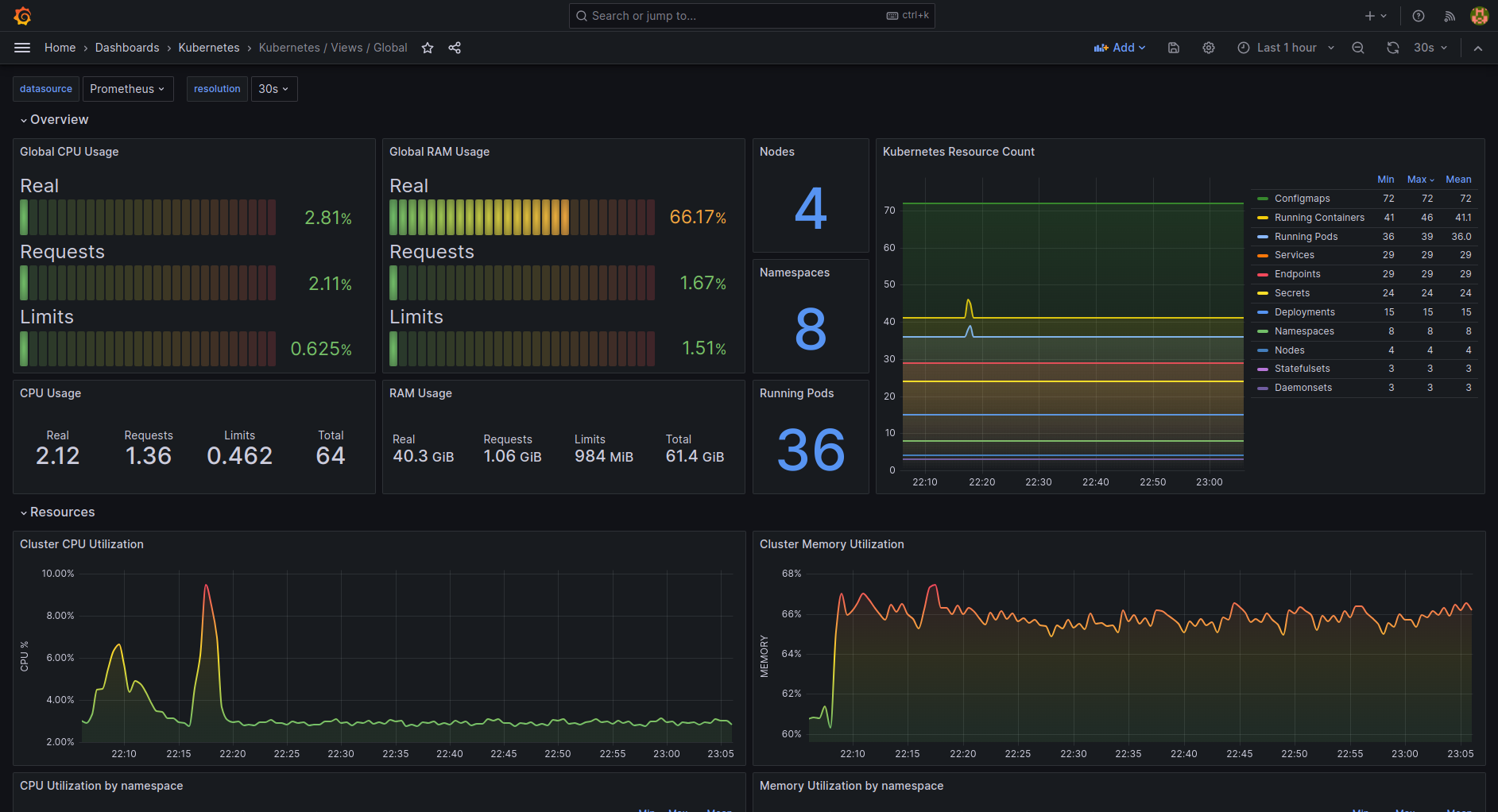This repository contains a modern set of Grafana dashboards for Kubernetes.
They are inspired by many other dashboards from kubernetes-mixin and grafana.com.
You can also find and download them on Grafana.com.
Theses dashboards are made and tested for the kube-prometheus-stack chart, but they should work well with others as soon as you have kube-state-metrics and prometheus-node-exporter installed on your Kubernetes cluster.
They are not backward compatible with older Grafana versions because they try to take advantage of Grafana's newest features like:
gradient modeintroduced in Grafana 8.1 (Grafana Blog post)time seriesvisualization panel introduced in Grafana 7.4 (Grafana Blog post)$__rate_intervalvariable introduced in Grafana 7.2 (Grafana Blog post)
They also have a Prometheus Datasource variable so they will work on a federated Grafana instance.
As an example, here's how the Kubernetes / Views / Global dashboard looks like:
| File name | Description | Screenshot |
|---|---|---|
| k8s-addons-starboard-operator.json | Dashboard for the Starboard Operator from Aqua Security. | LINK |
| k8s-system-api-server.json | Dashboard for the API Server Kubernetes. | LINK |
| k8s-system-coredns.json | Show information on the CoreDNS Kubernetes component. | LINK |
| k8s-views-global.json | Global level view dashboard for Kubernetes. |
LINK |
| k8s-views-namespaces.json | Namespaces level view dashboard for Kubernetes. |
LINK |
| k8s-views-nodes.json | Nodes level view dashboard for Kubernetes. |
LINK |
| k8s-views-pods.json | Pods level view dashboard for Kubernetes. |
LINK |
In most installation cases, you will need to clone this repository (or your fork):
git clone https://github.com/dotdc/grafana-dashboards-kubernetes.git
cd grafana-dashboards-kubernetes
On the WebUI of your Grafana instance, put your mouse over the + sign on the left menu, then click on Import.
Once you are on the Import page, you can upload the JSON files one by one from your local copy using the Upload JSON file button.
On the WebUI of your Grafana instance, put your mouse over the + sign on the left menu, then click on Import.
Once you are on the Import page, you can put the grafana.com dashboard id (see table bellow) under Import via grafana.com then click on the Load button. Repeat for each dashboard.
Grafana.com dashboard id list:
| Dashboard | ID |
|---|---|
| k8s-addons-starboard-operator.json | 16337 |
| k8s-system-api-server.json | 15761 |
| k8s-system-coredns.json | 15762 |
| k8s-views-global.json | 15757 |
| k8s-views-namespaces.json | 15758 |
| k8s-views-nodes.json | 15759 |
| k8s-views-pods.json | 15760 |
If you have ArgoCD, this will deploy the dashboards in ArgoCD's default project:
kubectl apply -f argocd-app.yml
Grafana dashboards can be provisionned as Kubernetes ConfigMaps if you configure the dashboard sidecar available on the official Grafana Helm Chart.
To build the ConfigMaps and output them on STDOUT :
kubectl kustomize .
To build and deploy them directly on your kubernetes cluster :
kubectl apply -k .
If you use terraform to provision your Kubernetes resources, you can convert the generated ConfigMaps to Terraform code using tfk8s.
To build and convert ConfigMaps to Terraform code :
kubectl kustomize . | tfk8s
Feel free to contribute to this project:
- Give a GitHub ⭐ if you like it
- Create an Issue to make a feature request, report a bug or share an idea.
- Create a Pull Request if you want to share code or anything useful to this project.

